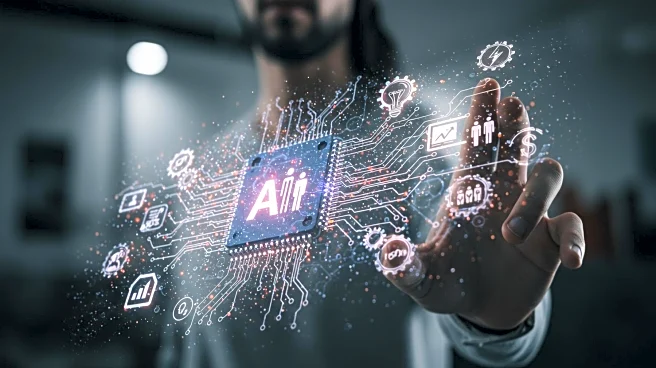What is the story about?
What's Happening?
A recent Reuters/Ipsos poll has highlighted significant concerns among Americans regarding the impact of artificial intelligence (AI) on various aspects of society. The survey, conducted between August 13-18, reveals that 47% of respondents believe AI is detrimental to humanity, while 31% disagree. The poll underscores worries about AI's potential to disrupt political systems, with 77% of participants expressing concern over AI tools like deepfakes that could manipulate political content. Additionally, 71% of Americans fear AI could lead to job losses, reflecting apprehensions about AI's role in transforming the workforce. The poll also notes concerns about AI's effect on personal relationships and its substantial energy consumption, with 61% of respondents worried about the latter due to the computing power required for AI operations.
Why It's Important?
The concerns raised by the poll reflect broader societal apprehensions about the rapid integration of AI technologies. The potential for AI to disrupt political systems poses risks to democratic processes, as AI-generated content could undermine trust in political information. The fear of job losses highlights the transformative impact AI could have on the workforce, potentially leading to significant economic shifts. Moreover, the energy demands of AI, driven by the need for extensive computing power, could have environmental implications, stressing existing infrastructure and resources. These concerns indicate a need for careful consideration of AI's role in society and the development of policies to mitigate potential negative impacts.
What's Next?
As AI continues to evolve, stakeholders including policymakers, businesses, and civil society groups may need to address these concerns through regulation and innovation. Efforts to ensure transparency in AI-generated content could help maintain trust in political systems. Workforce adaptation strategies, such as retraining programs, might be necessary to mitigate job displacement. Additionally, advancements in energy-efficient AI technologies could alleviate environmental concerns. Ongoing dialogue and collaboration among stakeholders will be crucial in navigating the challenges posed by AI's integration into society.
Beyond the Headlines
The ethical implications of AI's impact on personal relationships and its role as a potential substitute for human interaction warrant further exploration. As AI becomes more integrated into daily life, understanding its influence on social dynamics and mental health becomes increasingly important. The cultural shift towards AI companionship raises questions about the nature of human relationships and the potential for AI to alter traditional social structures.















